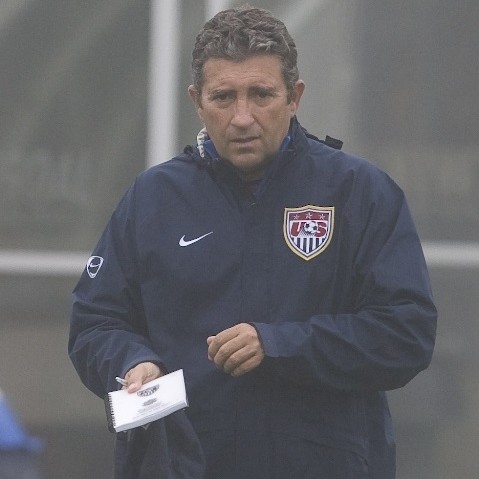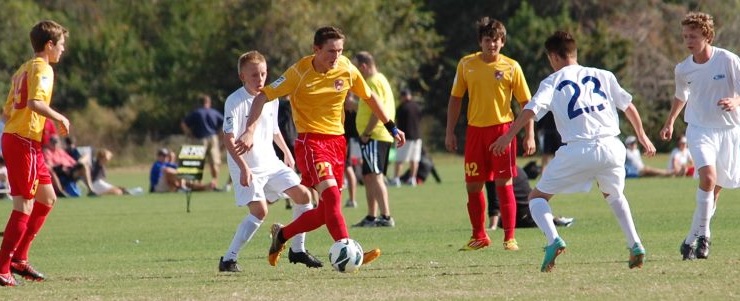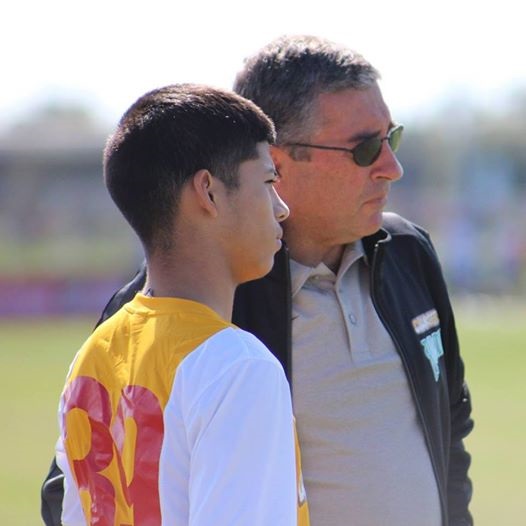SoccerToday Youth Soccer Coaches Interview Series
Born in Buenos Aires, Argentina, long time youth soccer coach Roberto Lopez is fluent in Spanish and Portuguese. Lopez is the current USDA Academy Director and Coaching Education Director for Chargers SC in Florida and instructor for US Soccer Coaching Schools. Lopez has been coaching for over 25 years and his experience in soccer includes a USSF A License, USSF Youth License, NSCAA Premier Diploma, NSCAA GK License Level 1 and AFC Ajax GK Certificate.
As part of SoccerToday’s ongoing series on Top Youth Coaches, here is our interview with Roberto Lopez, Chargers SC, US Soccer Development Academy Director.
Diane Scavuzzo: What is your coaching strategy?
Roberto Lopez: Build out of the back, play a possession style attacking soccer, hard work transitioning to defense.
Diane Scavuzzo: How has soccer changed since you became involved?
Roberto Lopez: It has changed drastically, it has become faster, more physical and in my opinion less technical, the US Teams at Development Academy level play a more controlled game, less long balls that what I saw in the late 80’s & 90s.
Diane Scavuzzo: What do you think U.S. Soccer needs to do to help soccer be more successful in the USA?
Roberto Lopez: Less games, less meaningless tournaments, more training, allowing the special players to develop their skills instead of limiting or stifling them, and lastly a bigger focus in development and less on winning at the younger ages. As a Coach that deals with U-16 players and above, I’m not interested on what they won at the U10, U12, level etc. I’m interested in what they learned and in the good habits that they may have.

Diane Scavuzzo: What makes a coach successful?
Roberto Lopez: Being organized, prepared, paying attention to detail, observant, good teacher, honest, approachable and not taking yourself too serious.
Diane Scavuzzo: What is the biggest problem in youth soccer today?
Roberto Lopez: Too many games, too much emphasis on winning, planning short term and too expensive to play.
Diane Scavuzzo: What has coaching taught you?
Roberto Lopez: To deal with all different types of personalities and to be patient with younger players.
Diane Scavuzzo: Please share your thoughts on the new U.S. Soccer mandates – How do you think small sided games will benefit development?
Roberto Lopez: It will help tremendously, more touches on the ball, less standing around, learning the basic tactics at a young age, improving and learning proper technique in a pressure type of environment.
Diane Scavuzzo: How about your thoughts on the birth year mandate.
Roberto Lopez: It’s about time, if we want to develop, we need to be the same as in the rest of the world. It may be tough to adjust for some early on, but it will make scouting and identifying players so much easier and we will not be at a disadvantage when we compete internationally.

Diane Scavuzzo: What important traits do you look for in a player?
Roberto Lopez: Technique is crucial for a player. You can be strong, fast and agile but if you can’t control the ball, it will mean little.
Soccer IQ, that’s what separates the top players from the rest.
Coach-ability, if a player can’t deal with feedback or doesn’t take criticism well, he or she will have a very hard time learning and improving on his or her game.
And, personality — a player who can’t deal with the adversity and the pressure of the game, at the high level, will fail. I personally like players who are outgoing and expressive.

Diane Scavuzzo: How do you deal with multiple sport athletes? At what age do you believe players should focus exclusively on soccer?
Roberto Lopez: In my opinion at about 14 or 15 years old, you should focus in the sport of your choice if you want to make something out of the game, most American sports have little if any relationship to Soccer.
Diane Scavuzzo: How confused do you think the typical soccer mom and dad are about the numerous paths in youth soccer for player development?
Roberto Lopez: Very confused, especially at the younger ages, for everyone there’s a level, winning does not translate to success and development. Not everyone can play in the top league, but everyone can play and enjoy the game, they just have to find the right fit.
Diane Scavuzzo: As a soccer coach, what do you consider to be your most difficult accomplishment?
Roberto Lopez: Scouting for the US U-20 Men National Team at the 2003 FIFA World Cup and not having the knowledge and experience that I have now when my team reached the U-17 National Finals in 1999 and loss in the final game.
Diane Scavuzzo: Who is (or was) your greatest role model or mentor, either personally or as a coach?
Roberto Lopez: Carlos Martinoli, instilled in me the idea that just because I played soccer, didn’t mean that I could coach or teach. Jay Miller, always is willing to share his knowledge with me, giving me great advice. My instructors Bob Gansler and Nick Slatar, for always going the extra mile to help me along the way.
Diane Scavuzzo: Who is your favorite soccer team? Who do you root for behind closed doors?
Roberto Lopez: Racing Club of Argentina, I grew up going to all of their home games. I have seen them become World Champions, Copa Libertadores Champions, Argentine Champions, and being relegated to 2nd Division. They have gone through tough financial burdens which nearly made the Club disappear, but through thick and thin, they are the team of my neighborhood, my family’s team and will always be loyal to them.
More about Chargers SC
The Chargers Soccer Club provides soccer opportunities to players throughout the Tampa Bay region with programs and fields in Clearwater, Lakewood Ranch and Tampa communities, covering all sides of Tampa Bay. The club is comprised of three communities in three different counties (Pinellas, Manatee & Hillsborough) that primarily draws players from six contiguous Bay Area counties (including Pasco, Sarasota & Polk counties).







